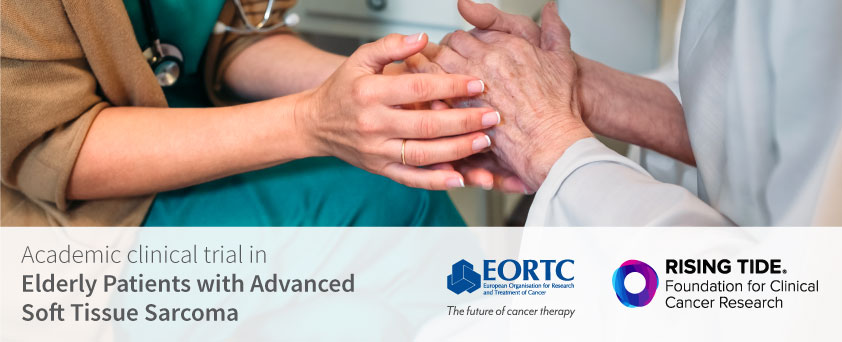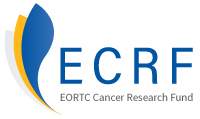EORTC Sarcoma clinical trial in elderly receives support from Rising Tide Foundation

Brussels, November 17, 2021 – Rising Tide Foundation for Clinical Cancer Research awards a grant to the EORTC 1976 Soft Tissue Bone Sarcoma Group (STBSG) & Quality of Life Group (QLG) TOLERANCE academic clinical trial, a study on health-related quality of life of elderly patients with advanced soft tissue sarcoma.
The challenge of treating the fast-growing population of elderly patients with cancer urgently requires adequate treatment, for which guidelines and evidence-based data are lacking.
To date, there is no consensus on the best treatment for elderly patients with inoperable or metastatic soft tissue sarcoma (STS). The numerous side effects associated with the standard doxorubicin-based treatments make the treatment of elderly patients very challenging.
The Cancer Research Grants
TOLERANCE is an academic clinical trial comparing different treatments for elderly patients with inoperable or metastatic STS, taking into account patients’ priorities in terms of quality of life and the impact of treatment on their ability to conduct daily activities, ultimately aiming to identify the best care for the elderly population.
Rising Tide Foundation awarded €500K to the EORTC 1976-STBSG-QLG study, marking the second collaboration between the two organisations. “Partnering with like-minded organisations is key to addressing unmet patient-centred needs in clinical cancer research, especially in rare cancers and underrepresented populations. The Rising Tide Foundation for Clinical Cancer Research is an invaluable ally. Their substantial support in the EORTC TOLERANCE trial will contribute to an important international randomised clinical trial that will set a new standard of care for the elderly”, commented Dr Denis Lacombe, EORTC CEO.
“Rising Tide Foundation for Clinical Cancer Research was founded to help patients improve their quality of life and win the fight against cancer. Our partnership with EORTC will work to propel the research to the next level and bring ground-breaking treatment options to the bedside of patients”, explains Wendelin Zellmayer, Director of the RTFCCR.
The sacroma clinical trial
EORTC 1976-STBSG-QLG TOLERANCE is a 3-arm randomised, open label, phase 3 trial coordinated by the EORTC HQ in Brussels. A total number of 185 patients aged from 65 years-old and diagnosed with advanced or metastatic STS will be enrolled over a period of 3.5 years. The trial will open in 31 reference cancer centres in 8 countries (CY, DK, DE, IT, JO, NL, ES, UK).
The primary objective of the study is to assess whether a higher health-related quality of life (HRQoL), in terms of impact of the disease and its treatment on physical and role functioning, is achieved with metronomic schedules of doxorubicin or cyclophosphamide plus prednisolone versus the standard doxorubicin treatment (3 treatment arms).
Secondary objectives include assessment of whether there is an improvement in quality of life, in terms of impact of the disease and its treatment on social, emotional and cognitive functioning as well as self-reported symptoms, among patients treated in each of the three arms. Furthermore, the study will assess whether there is a difference in the progression free survival, overall survival and tumor response while at the same time monitoring the toxicity profile and tolerability of the three treatment arms.
HRQoL assessment will be performed every 3 weeks during the first 12 weeks and every 12 weeks thereafter until month 12 after start of treatment. Disease evaluation will be performed every 12 weeks until progression.
Patient follow-up duration until primary objective, after LPI (last patient in), is estimated at 25 months to provide the targeted number of events for the study analysis. The overall duration of this study is 7 years and is coordinated by Professor Winette van der Graaf (Netherlands Cancer Institute Amsterdam).
EORTC recognizes patient involvement as a vital component of its clinical research activities, members of the EORTC Group of Patient Experts and Patient Panel were invited to review the patient information sheet and informed consent. Five sarcoma cancer survivors and caregivers have helped us to strike the balance between completeness of the information, document length and relevance of the research objectives for the patients.
“Patient engagement is a key principle of the Rising Tide Foundation for Clinical Cancer Research“ explains Shawn Stephenson, Chairman of the Foundation. The TOLERANCE study is a leading example of patient involvement in clinical trial design. “We are excited to partner with EORTC on this multicenter phase 3 study, with the potential to provide better treatment options and improved quality of life for elderly patients.”
On the study’s importance, Professor Winette van der Graaf commented: “With a general rise in age, we diagnose more soft issues sarcomas in elderly people than before, but we lack data to support an optimal treatment schedule in case of advanced or metastatic disease in this age group. We are delighted that we will run a study with a novel trial design with widely available drugs, which will increase our knowledge both in term of efficacy and quality of life in this patient population.”
For more information and press enquiries please contact us at communication@eortc.org
About the Rising Tide Foundation for Clinical Cancer Research
Rising Tide Foundation for Clinical Cancer Research (RTFCCR) is a charitable, non-profit organization established in 2010 and located in Schaffhausen Switzerland. RTFCCR’s primary consideration in granting support is given to truly innovative, unique, patient-centered clinical research. The long-term ambition of the foundation is to optimize partnerships and attract the best in Phase I to Phase III clinical trials that aim to bring maximum patient benefit in the shortest time possible. With patients at the core of the mission, the foundation strives to support clinical trials resulting in the creation of less toxic therapeutic approaches, better disease burden management, earlier cancer detection, and innovative intervention strategies that will lead to increased quality of life and survival.
You can also help support EORTC’s game-changing clinical research to unleash scientific breakthrough and transform cancer patients’ lives. Learn how to GET INVOLVED, or Make a Contribution Now.







Get Social